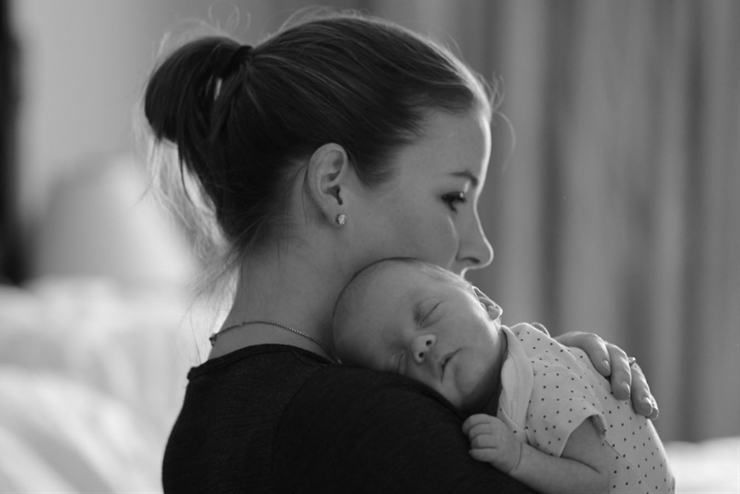A little over a year ago I got a note from a reader who told me she was leaving her present job for a better one. She was climbing the ladder of success and… heading home.
That’s right, her new job was one which the corporate world might frown upon, with responsibilities including changing diapers, wiping runny noses, and making meals for her husband and two little children. Such a decision came after wrestling for many months over how to be a good employee while still being a good mom. In other words, she had a bad case of “Mom Guilt.”
Many would argue that “mom guilt” is just a thought that needs to be rooted out of female minds immediately. Sometimes I agree. Mothers place more pressure on themselves than is necessary in many areas.
But in this instance, I’m not so sure. When it comes to struggling to juggle a career and motherhood, is mom guilt actually a good thing?
Absolutely not, declares a recent Wall Street Journal article. Adapted from Joann Lublin’s forthcoming book Power Moms, the article profiles a number of female executives, showcasing the ways in which they shrug off mom guilt from holding down a high-pressure job rather than spending more time with their children.
Efficiency is key, one mom says, recommending time-saving tips ranging from faster hair-drying methods to pre-planned outfits to expedite packing for business trips. Having “me time” is another suggestion, while having kids “select the most important events” for mom to attend is another. Mary Hamilton, a managing director for a consulting firm, tries to get rid of her mom guilt by setting aside one day per year to do something special with each of her children. Jane Stevenson, another consulting executive, took that move a step further by taking a sabbatical for a whole year in order to spend time with her children, adding that “it was the best year of my life.”
In examining these women, a few threads come forth. The first is that they all seem to acknowledge mom guilt over spending so much time away from their children is very real. The second is that the mother who took the most time off to spend with her children (Stevenson) seems the happiest.
These two observations are concerning, especially since a career supposedly makes a woman feel empowered and fulfilled. Yet since greater career opportunities opened up for women over the last several decades, their happiness levels have decreased while men’s have stayed roughly stable, to the point that women are now less happy than men. The opposite was true 50 years ago. Could some of that unhappiness be related to the mom guilt mothers experience as they miss nurturing their children full-time? If so, why do we put so much pressure on women to be in the workforce?
The answer to that question seems to point back to feminist ideals. Proponents of feminism often have a two-pronged attack: 1) make women think they can have it all; and 2) degrade men.
Men were once the breadwinners of the family, be they in a high-end, white collar profession like law, or a middle-class, blue-collar job like carpentry. Yet today our culture makes it difficult for men to support a family. Women are often prioritized in hiring, as their female status meets diversity quotas, and blue-collar jobs that make a decent wage are quickly disappearing due to politically correct policies such as strict environmental standards which shut down pipelines and factories. The more difficult it is for men to hold down a good-paying job, the more difficult it is for women to believe they can ditch a major source of mom guilt by accepting the natural draw to stay home and raise their children.
This dilemma also contributes to the idea that women can have it all. Our materialistic society has convinced us that new cars, brand-name clothes, regular dinners out, and expensive vacations are all a part of the good life. When a woman’s husband cannot support such materialism on his single salary, women are convinced they must head to the workforce to pick up the slack. Add in the notion that successful women pursue college educations, even obtaining multiple degrees in the quest to break glass ceilings, and the idea of giving all that up in order to raise children makes women feel like failures.
But are women really a failure if all they do in life is stay home and raise children? Hardly. As the famous poet William Ross Wallace reminds us, “the hand that rocks the cradle is the hand that rules the world.” The poem continues:
Woman, how divine your mission,
Here upon our natal sod;
Keep—oh, keep the young heart open
Always to the breath of God!
All true trophies of the ages
Are from mother-love impearled…
In other words, the glories and rewards of motherhood extend beyond the rulership of this world and into the next. When that kind of happiness and privilege is offered to women by tending and nourishing the little plants given to us in our children, doesn’t it seem a bit foolish to make ourselves miserable with guilt while chasing after the trophies of wealth, fame, or prestige?
Image Credit:
[Image From: Flickr-Mark Colomb, CC BY 2.0 ]

Leave a Reply